Project Ara: everything you need to know
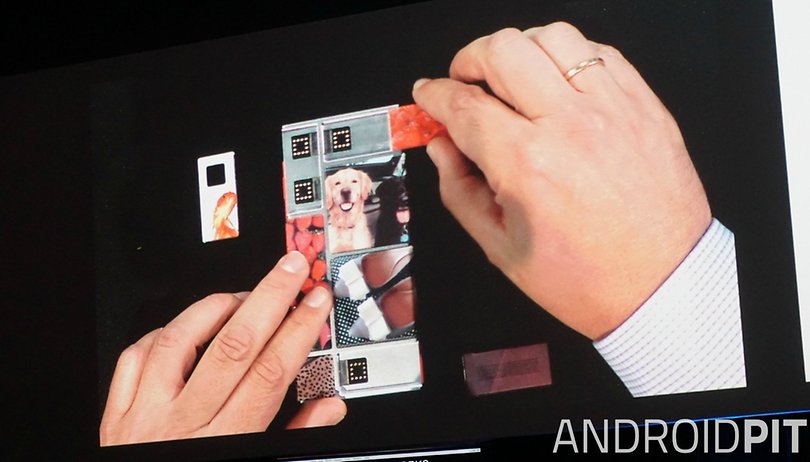

LEGO doesn’t make phones, but if it did, it would probably make something very like Project Ara. But what is Project Ara? Instead of buying a phone that’s obsolete within a matter of months, Ara proposes that you buy a modular design instead. When one part gets old or a better version appears, you just swap the old component for a new one. It sounds great, but will it work? Find out everything you need to know about Project Ara right here.
- Android M: what's new?
- When will I get Android M?
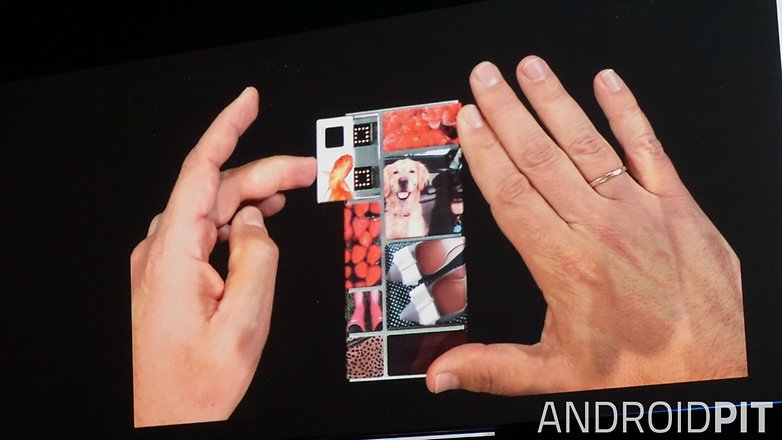
Project Ara delay
A recent tweet from the Project Ara team confirmed that Puerto Rico would no longer be the location of the Project Ara Pilot. It has now also been revealed that the initial launch has been postponed until 2016.
The reason for the change in location isn't exactly clear, but the delay is said to have been caused by the development of "lots of iterations" of the device, and is probably because Project Ara has now abandoned the electromagnetic design of its modules.
This had, for a long time, been the intended way to attach and detach modules from the body of the device, but it was hinted that the device's structural integrity wasn't holding up in drop tests, so another design route is now being pursued.
No more electropermanent magnets. #ProjectAra #FailedTheDropTest
— Project Ara (@ProjectAra) August 19, 2015
Once we learn more about when and where Project Ara will be launched we'll let you know. For now, head below for all of our previous Project Ara coverage.
Project Ara at Google I/O 2015
Project Ara only made a short cameo during Google's Advanced Technologies and Projects (ATAP) group session at I/O 2015, but boy, what an impression it made.
The last time we saw an Ara prototype was at Mobile World Congress (see below) but it didn't work. The exoskeleton was impressive, but the sneak peek lacked any real oomph because the unit was non-functioning. The Project Ara demo at I/O just blew my mind.
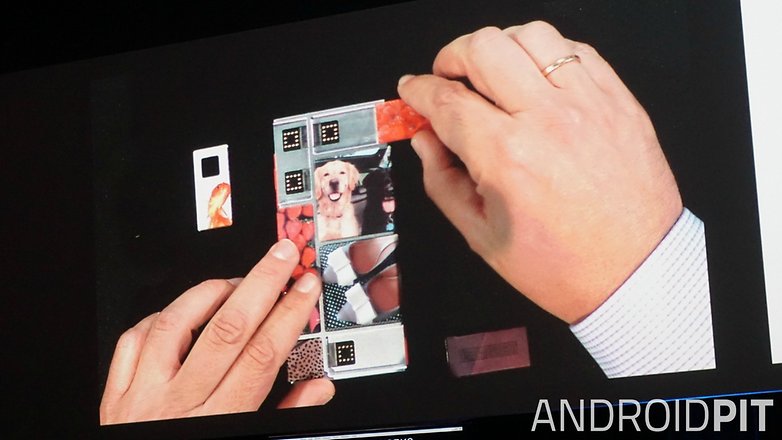
In a three-minute demo at the end of ATAP's presentation, the audience witnessed an Ara device get assembled (but without a camera), booted up and then saw the missing camera get inserted.
The runtime detected it and the camera app started working, all in about five seconds. If you've been wondering just how impressive and adaptable to real-life use cases the actual hardware of Ara modules will be, we just got a really good first look.
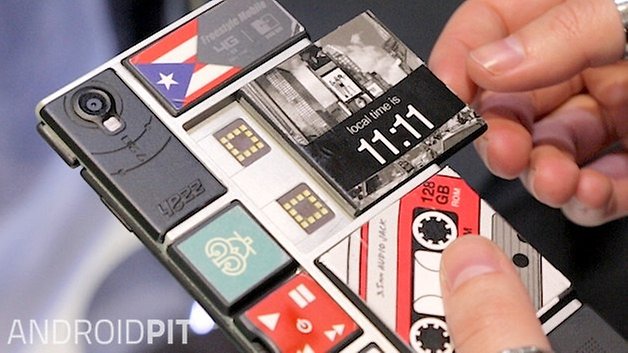
Project Ara at MWC 2015
Project Ara's prototype modular smartphone also made an appearance at MWC 2015, but it was not a finished product -- in fact, it didn't even switch on. Instead, Project Ara's introduction at MWC was basically to display the device modules, and how they would fit with the device shell or endoskeleton. The component mock-ups were shown-off by US-based company Yezz Mobile, a (relatively) small smartphone manufacturer whom Google is partnering with the Project Ara launch.
Yezz has been working on hundreds of component concepts for screens, cameras, batteries, antennas and more for Project Ara, with components arriving in three sizes: one by one, two by one, or two by two squares. Though the modules will have a variety of functions, each will be made to a certain device standard so that they can easily be swapped with components from any other manufacturer; it's very similar to how PC computer components are swapped-out and upgraded.
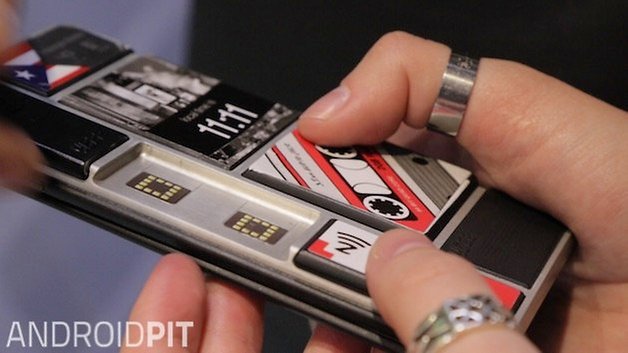
The advantage of Project Ara is that it provides users with far greater control over their handsets than is usually possible -- consumers can spend money only on the components which most interest them. Additionally, there is a much larger scope for the capabilities of a Project Ara device, as manufacturers will be able to produce modules for whatever they want.
While we enjoyed playing with the modules and learning of more Project Ara concepts, most of the information was already known, and now we're just eager to get our hands on a working model. The device could be launching in the next six months and we'll keep you informed with all of the latest news until then. Check below for our previous coverage.
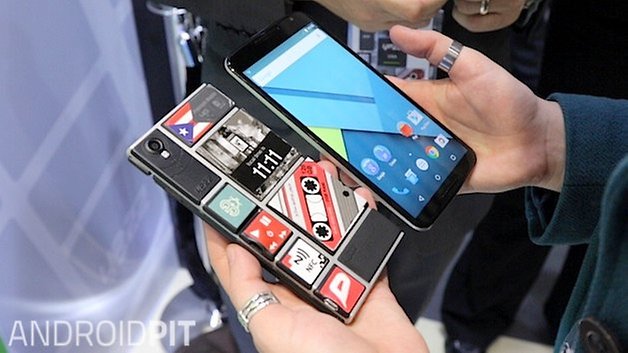
Project Ara: what’s the big idea?
We gave it a new name and built a prototype earlier this year, and it retained project Ara when it sold its recently acquired Motorola division to Lenovo.
The idea behind Project Ara is simple enough, although Google doesn’t do it any favors by describing it as “a development effort to create a modular hardware ecosystem”. It takes a smartphone and breaks it down into LEGO-style blocks, and those blocks are attached to each other and to a metal base plate using magnets. The base plate is shaped with block-sized slots to make assembly easier and to help reinforce the overall structure.
Who is Project Ara for?
At the moment it’s for hardware and software developers, but the ultimate aim is to bring Ara worldwide, even those who don’t currently have mobile internet access.
Project Ara release date
Paul Eremenko, the Project Ara director, has stated that a "market pilot" for Project Ara is being conducted in the second half of 2015.
The market pilot (essentially an introductory test on a small scale) is being conducted to answer a variety of questions that the developers still have, including concerns regarding how an abundance of "choice" can worry a consumer, often leading to disappointment after purchase. Eremenko said that the only way to research this was through the market pilot.
The market pilot will be held in Puerto Rico and if successful it will be subsequently launched in more markets later in the year.
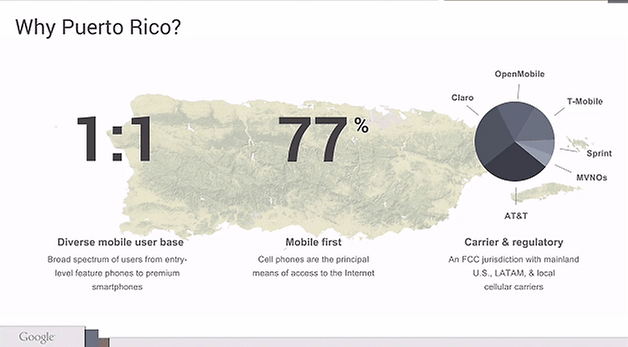
Project Ara price
No pricing details are available just yet, but because of its customizable nature, the price for the basic Project Ara hardware will start low (possibly around 200 USD) and any further costs will depend on what kind of components you wish to add.
Is Project Ara connected to the Nexus range or Google Silver?
No, it’s a completely separate project. Ara devices will run Android, but they won’t be Nexus- or Google-branded products.
Project Ara features: why would I want a Project Ara phone?
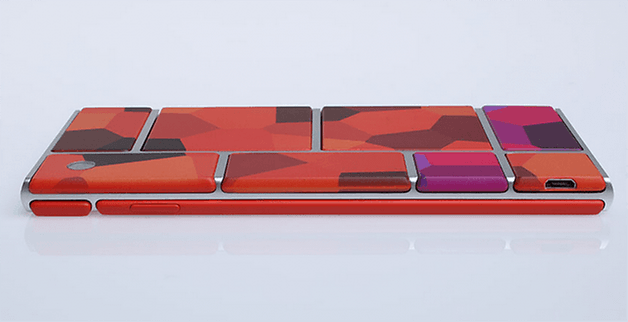
Lack of built-in obsolescence is a major selling point here. If you’ve ever binned a perfectly good phone because you wanted better battery life, a better camera sensor or a better mobile data experience you’ll know that in many cases you’re sacrificing perfectly good components for the one or two extra features you want.
With a Project Ara phone you’d be able to replace just the bits you want to replace. You wouldn’t even have to turn your phone off. It’d save you money, save the environment, make people find you even more sexually attractive… you get the idea. In the long term you might even be able to 3D-print the components to make a smartphone that’s completely and utterly unique.
Another key selling point is repairability. If something goes wrong with the innards of your smartphone it’s often new-device time; with an Ara device you’d just replace the broken bit and keep on computing. That helps cut down on unnecessary electronic waste too.
How did Project Ara get its name?
The project’s lead mechanical designer’s name is Ara. Just as well he isn’t called Sammy Crap-phone.
What is the Project Ara module marketplace?
The Project Ara module marketplace is where the modules (components) for the device will be bought and sold. It has been compared to the Google Play Store, with similar user-reviews and recommendations, but instead of apps it will contain batteries, cameras, speakers etc.
Phonebloks, the team behind Project Ara, has recently written a blog post which clarifies the workings of this space, saying the Ara Module Marketplace is:
an e-commerce portal that enables a two-sided market between module developers and consumers. Google will help module manufacturers with the sale, the payment processing and will verify that the modules are safe and that they respect all the technical specifications. A third party logistic provider will manage the storage, shipping and all trade issues.
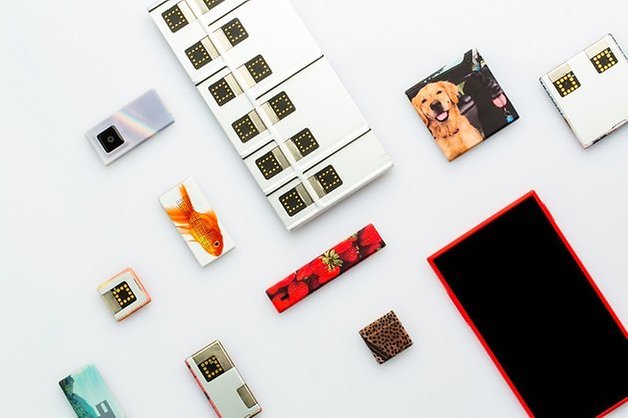
Does Project Ara have an accompanying app?
Yes. Google has just released MDK 0.2, the second major iteration of its toolkit for third-party developers, which includes details on how best to create a module for Project Ara. Additionally, the new MDK references an Ara Manager app, which will "allow users to get detailed information on all the modules currently attached to their device and swap them by commanding the [electro-permanent magnets] in the Endo to release." In layman's terms, this app will allow users to troubleshoot and configure the various modules they plug into their phones.
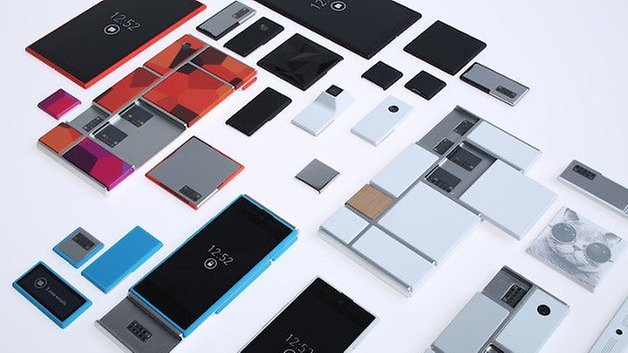
Project Ara all sounds too good to be true. Is Project Ara vaporware?
Maybe. Early coverage suggested that Ara could be as big a deal as Google Glass, but of course so far Google Glass hasn’t been that big a deal. The main areas of concern are weight and bulk - by its very nature an Ara device can’t possibly be as slim as today’s all-in-one smartphones - and whether the cost of buying multiple components means that an Ara phone would end up costing more than an off-the-shelf one, which would seriously ruin its sales.
There are potential compatibility issues and performance concerns too. Remember the good old days of Windows PCs with their endless device driver problems and hardware conflicts? Exactly.
Project Ara has often been compared to the idea of building your own PC: instead of buying a device that isn’t quite perfect, if you go down the DIY route you can end up saving money and making a machine that fits your needs perfectly. That’s true, but if you look at the sales figures most people are perfectly happy with a good-looking laptop.
When will we see more about Project Ara?
Google is gearing up for a "market pilot" scheduled for the 2nd half of 2015, where Project Ara will be made public. If it's a success, Project Ara is expected to expand to other territories before the end of the year.
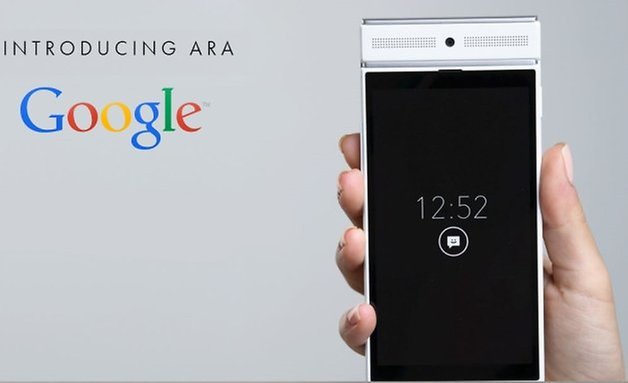
Should I be excited about Project Ara?
Cautiously, yes. If it delivers on its promises you could see the equivalent of the Google Play Store for smartphone hardware as well as apps. A phone that never becomes obsolete, that doesn’t require really expensive replacements every year or two and that can be repaired for pennies is a great idea, and the customization options are effectively limitless. If you want a device that’s truly your own, Ara promises to be the ultimate way of creating it.
That said, if Ara was Android we’d still be in the days of Android Astro Boy, Bender and R2-D2: a system with lots of potential that isn’t remotely ready for prime time. It arguably took Android four years to really hit its stride (with Ice Cream Sandwich, AKA Android 4.0), and getting the hardware equivalent right might take even longer. If Ara works it could revolutionize mobile computing. It just probably won’t do it in 2015.
What do you think of Project Ara? Are you looking forward to modular phones?
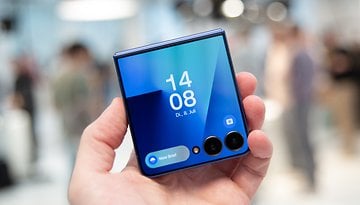

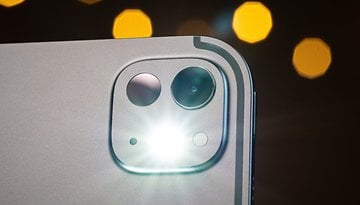
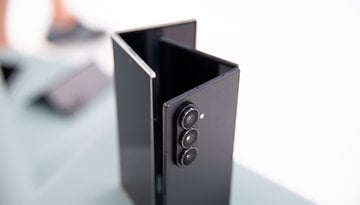
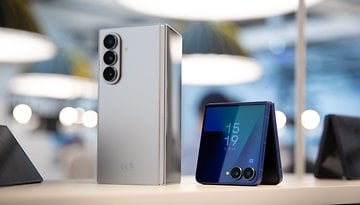

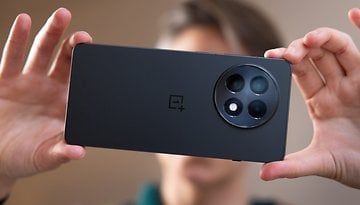




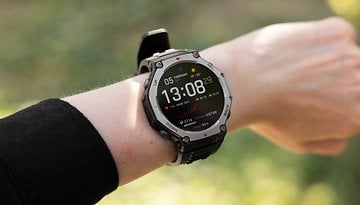


I was looking forward to the LG V10, but that's not coming to the UK. Does anyone know if Project Ara is due for release in the UK?
and don't forget to make Project Tango module too, hha
This will surely kill other phone manufacturers. And everybody will also manufacture the same concept. I wonder if samsung, LG or Sony will also make some kind of this phone, would there be a universal modules for any brand?
guys this is a good product but it lacks few things and 1 of them being its parts any 1 can easily take my parts or steel um while i m not looking my point is u guys will put permanent magnetic locks why not somehow us that lock to lock screen and also lock the blocks so no 1 can take um out without my fingers if u guys are able to do that to this phone it will b the best phone ever
Well... That lock part you wrote is kinda stupid..
Anyone can steal you phone atm. If you're not looking and leave your phone at a public place, it will surely be stolen. I'll guess your best option is too keep your phone safe. -_- (like with any other phone)
What he's saying is not wrong, if you steal a Phone it has some kind of Security Feature, so that nobody else could use it. But if these "Bloks" don't have something like this they could easily be stolen and reused in another Phone.
Decent article until you lose your brain saying ics was good. It was a nightmare. Another tech writer with just opinions and no experience
When it release.....
This just sounds way too complicated. Bring back the old flip phones!
After final release of project ARA phone, ARA phones will be the best phone of all time
I will dich my Samsung Galaxy S4 and will ran to buy Ara phone with my custom specification of the phone I would really love to build my phone with my hand
Really cant wait more for final release
I think this phone will kill other smartphone manufactures
No doubt this is a great idea. But one may wonder how far the unit will function as the author describes. During the course of time there will be incompatibility same as the personal computers. For eg: We couldn't install i3 processors on a P4 mother board, certain components will function only with certain version of OS
You will just change speakers, display, mainboard with cpu and memory, battery, camera etc... It will be compatible.
If it works with PC's , it works with smartphones. With PC's you will always find compatible components... the same with the smartphone, in fact, smartphones are just itniy pc's :) Can't wait to customize mine...
Ram upgrade, storage upgrades on the fly, great. Faster processor every year or even every 6 months, marvelous. Instant screen repair, love it. If this comes out I'll drop iPhone in a heartbeat.
Project Ara = the concept of letting consumers choose what sort of Android Smartphone they want via a modular selection is brilliant (everything from the very size of the smartphone, external construction - polymer or metal, processors, camera megapixel, screen size / pixel hi def, etc are all up to the consumer to decide upon vs the manufacturer trying to sell). imagine being able to upgrade, or modify, your Android Smartphone anytime without having to buy a brand new smartphone ..... it sounds too good ro be true!
Knowing Microsoft, it doesn't have to be Android!
thats really very cool idea
Is it wrong to lust for this to come to fruition?
Heard about this originally some months ago and was very interested. Lost interest the moment I saw Google are now involved.
Wouldja prefer Apple to make it?